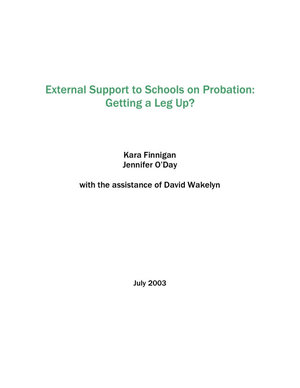This report focuses on the provision of external assistance to probation schools. Our examination of this component is based on a two-year, multi-level study of the design and implementation of the school probation policy in Chicago’s elementary schools. Following this introduction, we provide an overview of the role and system-level design of external assistance. We then outline the analytic frames and data sources that informed this investigation. Next, we describe the design and implementation of assistance at the support provider level. We conclude with a discussion of the overall strength of the support system and implications for policy and practice.
In 1996, the Chicago Public Schools (CPS) established a school accountability system that identified low-performing schools. The system intended to improve student achievement by providing failing schools with a mixture of external supports and consequences. Schools were placed on probation if fewer than 15 percent (subsequently raised to 20 percent) of their students scored at or above grade-level norms on the Iowa Tests of Basic Skills. Probationary changes to schools included the provision of external partners, the addition of on-site professional development activities, and, in contrast, reduced autonomy and the threat of further sanctions, such as school reconstitution.
This report illuminates a two-year analysis of the design of CPS’s accountability policy and its implementation in Chicago’s elementary schools. Findings center on the role of external partners and probation managers in their implementation of the policy, the constraints their influence posed, and numerous suggestions for policy changes to assist urban centers, such as Chicago, in these dedicated school reform efforts.
Because external partners and probation managers continue to assist failing schools today, both in Chicago and nationally, this study will inform policies and practices in numerous urban areas.
